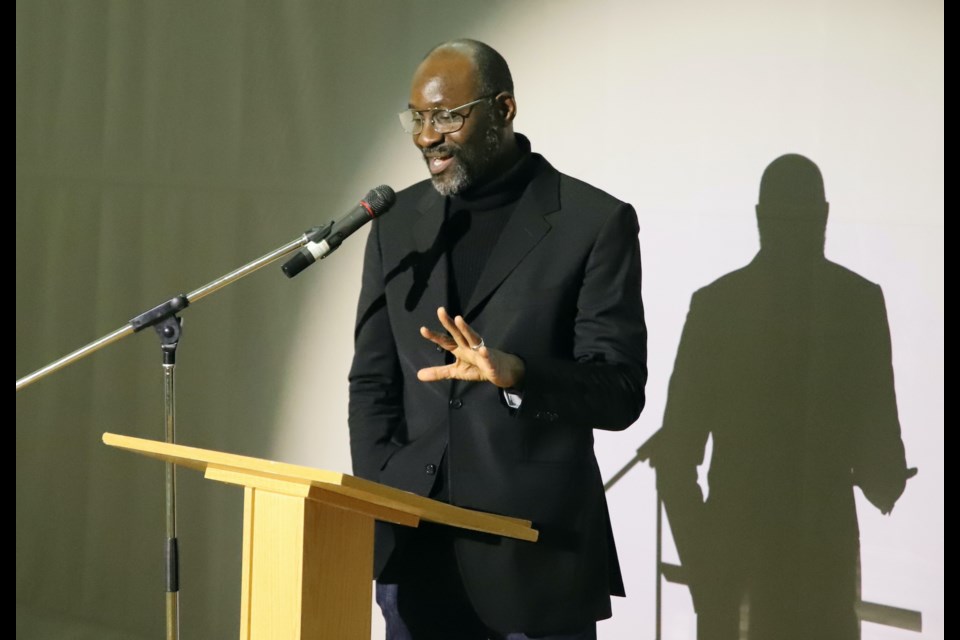OLDS — A former École Olds High School (ÉOHS) student says Black Canadians often aren’t accepted as being Canadian so they suffer a kind of “erasure.”
Bertrand Bickersteth who now teaches at Olds College of Agriculture & Technology, made that statement in a keynote address to students during the ÉOHS Diversity Day on March 21. It was one of several different presentations on diversity delivered during the day.
Bickersteth said the erasure idea was raised by author George Elliott Clarke.
“He says that to be Black and Canadian is to suffer a kind of erasure,” Bickersteth said. “You get erased. One part of you, your Canadian part, gets erased with respect to your Blackness.”
Bickersteth said while he was growing up in Canada, on about a weekly basis, White Canadians would ask him where he was from.
No matter how many times he’d say he was from “here,” they wouldn’t believe him and would ask him again.
“I experienced this regularly. In fact, I still experience it,” he said.
Bickersteth said this misunderstanding is the result of discourse – a generally accepted view of the world that people absorb without even really knowing it.
Part of that discourse, he said is a common misconception that if a person is Black, he or she must not be Canadian by birth.
“When I was young it was very confusing, very confusing. Just imagine you’re five years old and some guy is like, ‘where are you from?’ And every answer you give is not satisfying,” Bickersteth said.
“By the time I was a teenager, I was very angry. I didn’t know why I was angry, but being an angry young Black man was a script I was allowed to have, and so that made sense to people, so I could do that one,” he added.
“And then when I was older, I learned about discourse.
And all those years (when) I thought there was something wrong with me and I was doing something wrong, I finally realized it had nothing to do with me.”
Stereotypes about people are another part of that discourse; for example, that all Black people are great athletes and great comedians.
“We can’t say that every Black person is good at all these things and we can’t say that there are White people who do not have these things,” he said.
Discourse also shapes history, Bickersteth said.
“Whoever owns the discourse writes the history,” he said.
He pointed out that several Black people were key explorers and settlers in Alberta as far back as the late 1700s and certainly around the turn of the last century, and yet Albertans don’t learn about most of them, except John Ware, a well-known rancher.
“It’s because history itself has tunnel vision so it only moves in a particular direction,” Bickersteth said.
“History has this two-way thing going on. We learn from the past, but we also shape the past from the present.”
Another example of how discourse shapes us is a common idea that the colour pink is for girls and blue for boys.
Bickersteth said White people and their culture are perceived as normal, as a given, whereas the cultures and achievements of non-Whites are seen as unusual, different.
Thus, he said, we speak of “the Black president of the United States,” or the “female CEO.” Those adverbs are never placed in front of white U.S. presidents or White male CEOs.
“I’m sure none of you ever heard about the very first White, male prime minister of Canada, John A. MacDonald. No. Nobody hears that. You don’t have to mark White or male; you don’t have to. That’s presumed already,” he said.
“It’s when its outside of that that we have to force it; we have to mark the language.”
Bickersteth said one solution this problem is to be honest when these situations occur.
“Now you know there’s a thing called discourse, you know there is a tunnel,” he said.
He told his audience that when they face situations in which they may resort to stereotypes about men, women, or non-White people, they should be honest with themselves and work to correct them.
“And then when you step forward, you’ll see that you can make a difference in your world,” he said.



